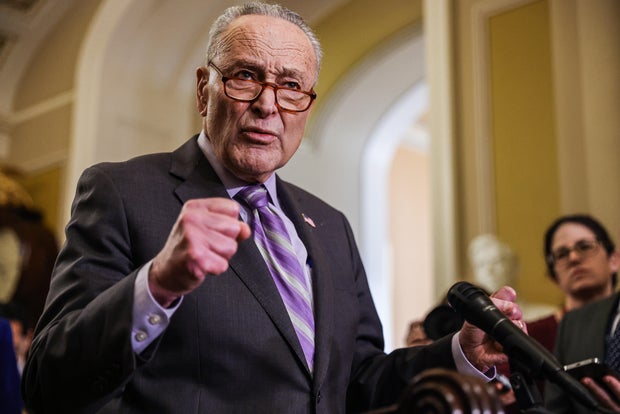Washington — The Senate is set to take up a key vote Wednesday afternoon on a long-anticipated border deal as part of a national security supplemental funding package that will likely come up short on support after far-reaching Republican opposition became clear quickly after its release this week.
Although Senate Republicans appeared resigned to oppose the procedural vote to open debate, with the conference in large part either opposing the border deal released on Sunday or seeking more time to review it, Senate Majority Leader Chuck Schumer planned to forge ahead with the vote on Wednesday.
“For the security of America at the border, for the security of Ukraine and Israel, we’re going to keep at it,” Schumer told reporters on Tuesday. “We will move further forward. Stay tuned.”
Indeed, Schumer appears to have a backup plan — to put the other elements of the supplemental funding package up for a procedural vote should the broader package that includes the border security agreement fail, according to a Democratic aide. Outside of the border elements, the national security supplemental includes military aid to Ukraine, Israel and Taiwan, along with humanitarian assistance for Palestinians in Gaza.
Whether the move would gain the necessary 60 votes in the chamber to move the package forward remains to be seen. But it comes more than four months after the initial standoff over the funding package requested by the White House began, when some Republicans pushed to link the funding for Ukraine with enhanced border security measures.
Valerie Plesch/Bloomberg via Getty Images
Former House Speaker Kevin McCarthy first touted the move widely in the final days of his speakership, in what appeared to be a gesture to House conservatives who would eventually vote to oust him. He emphasized at the time that Ukraine wouldn’t receive another U.S. aid package “if the border is not secure.”
“I support being able to make sure Ukraine has the weapons that they need. But I firmly support the border first,” McCarthy said on “Face the Nation” in October. “So we’ve got to find a way that we can do this together.”
Some House Republicans had already grown skeptical of more aid to Ukraine in particular, while more Senate Republicans generally backed continuing to support the effort to ward off Russia’s advances. But the GOP quickly coalesced around the idea that the U.S-Mexico border should be addressed if Ukraine was to receive additional aid.
But just four months later, after the party largely rejected the border security components of the supplemental, some Republicans expressed openness to backing it without the border provisions, as Democrats accused the GOP of changing its tune on the border.
“Within 24 hours of releasing the long-awaited bipartisan compromise that our Republican colleagues demanded as a condition to move Ukraine forward, Leader McConnell and the Republican conference did a 180-degree reversal,” Schumer said. “They were quaking at the knees at the fear of Donald Trump.”
The dynamics make the supplemental funding package’s prospects, without border security, unclear. Senate Minority Leader Mitch McConnell threw his support behind the move on Tuesday, calling the other elements of the supplemental “extremely important” and arguing that “we ought to tackle the rest of it.”
But even if the national security package passes the Senate, its future is even more up in the air in the Republican-controlled House.
Nikole Killion and Alan He contributed reporting.
